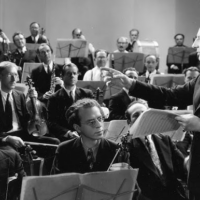In the 90s I lived in Regina, Saskatchewan. When I moved there I had never been before, but I had been looking for work, my PhD in-progress dissertation was a bit of a train wreck (I finished it eventually), and the university there was kind enough to offer me a position. Our lives go through stages, and for me a bit of moving around, but when I look back on my Regina days, the thing I remember most fondly was the group of friends I had who were all very interested in contemporary culture, who liked to take it in, and talk about it at the pub. … [Read more...]
How should we evaluate guaranteed income for artists?
Back in the day, I took a few years leave from academia to work in the public service, as a policy advisor to the Cabinet of the government of the province of Saskatchewan. We would receive from various line departments proposals for policy changes or new initiatives, and a large part of my job was to work with our team to evaluate these proposals and write up advice to the Cabinet. I have never forgotten how my boss in this office approached proposals: she would ask, as a gateway question, “what problem are they trying to solve?” If there was … [Read more...]
The predictable result of arts organizations and cell phones
The Inquirer reports that cell phones are presenting a problem at the Philadelphia Orchestra: Another orchestra season, another soul-killing cell phone interruption. As banal as it may be, Saturday night’s mid-Bruckner cell phone incident at the Philadelphia Orchestra is a painful thing to ponder, a kind of musicus interruptus from which a performance never really recovers. Yannick Nézet-Séguin wasn’t asking for anything unreasonable when he once again suggested to the audience that maybe they … [Read more...]
Thomas Hardy on rural creative placemaking
"The town was intentionally bent upon being attractive by exhibiting to an influx of visitors the local talent for dramatic recitation, and provincial towns trying to be lively are the dullest of dull things. "Provincial towns are like little children in this respect, that they interest most when they are enacting native peculiarities unconscious of beholders. Discovering themselves to be watched they attempt to be entertaining by putting on an antic, and produce disagreeable caricatures which spoil them." From Desperate Remedies … [Read more...]
On the display of shocking art: get a room
The Guardian reports that a gallery in the small Welsh town of Hay-on-Wye was investigated (though not prosecuted) by police after complaints of a painting placed in the gallery’s front window. At artsjournal.com, where I first found this story, the very knowing headline is “Some Welsh folks called the police on a gallery’s front window”, and so we know where this is all going: rural rubes can’t handle art. With its literary festival and numerous bookshops, Hay-on-Wye may attract the biggest talents in the arts but, … [Read more...]
Should opera companies just slash their ticket prices? Updated with responses to comments
The Philadelphia Inquirer reports that Opera Philadelphia is radically cutting their prices (the article is paywalled, but you get 6 months of the Inquirer for a buck, which is not a very high wall): In the first 48 hours after unveiling its new “pick your price” ticket program Tuesday morning, Opera Philadelphia sold 5,876 tickets — an extraordinary response that has fueled company hopes that it could sell out the season. “Just seeing what the numbers are was very, very moving to me, because for my entire career in … [Read more...]
Does it matter if the subsidized arts are mostly attended by the well-off? (updated)
I have a new paper out, “The pursuit of equality through public funding for the arts”, in Innovating Institutions and Inequities in the Arts, edited by Joanna Woronkowicz and Doug Noonan.1 To explain what it is about, let me start with a completely different policy field: reducing the use of fossil fuels. Here is the abstract from a working paper from the NBER released just a week ago, by Severin Borenstein and Lucas Davis, “The distributional effects of U.S. tax credits for heat pumps, solar panels, and electric … [Read more...]
On the Florida Arts Funding Cuts: Beyond the Fringe
Last week Florida governor Ron DeSantis vetoed $32 million in arts funding, which in that state is managed and allocated by the Division of Arts and Culture. The Miami Herald reports: Gov. Ron DeSantis on Thursday cited “sexual” festivals in Orlando and Tampa as the reason he vetoed more than $32 million in arts funding across Florida this month. “You have your tax dollars being given in grants to things like the Fringe Festival, which is like a sexual festival where they’re doing all this stuff,” DeSantis said during a news … [Read more...]
Arts presenters need to show some spine
In class I’ve told students I don’t like the phrase “cancel culture” since it is never quite clear what the speaker means by it. But arts presenters keep going around cancelling artists, and so I might need to rethink my stance on this. The art museum on my own campus cancelled a long-planned art exhibit by Palestinian artist (and Indiana University alumna) Samia Halaby on the grounds that she is an activist for the rights of Palestinians (the official IU line was that this was about “security”, which not a single person on this … [Read more...]
Why Public Funding for the Arts: A Personal View
I wrote a book looking at how different ways of moral and political theorizing drew different conclusions regarding whether the state should, or should not, subsidize the arts. At the very end of the book I give something of a personal view. There is a review circulating that is terribly confused about this (I won’t link - I read it so you don’t have to), and so I thought it would be worthwhile to just put out there what I wrote in this short conclusion, edited for brevity. First, to make a claim for public funding for the arts it is … [Read more...]










